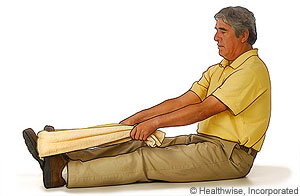
Overview
Nighttime leg cramps happen when a leg muscle tightens up suddenly. This most often happens in the calf. But cramps in the thigh or foot are also common. Cramps often occur just as you fall asleep or wake up.
Leg cramps can be painful. They can last a few seconds to a few minutes. Though they are common, experts don't know exactly what causes them.
To treat muscle cramps, you can stretch and massage the muscle. If cramps keep coming back, your doctor may prescribe medicine that relaxes your muscles.
Follow-up care is a key part of your treatment and safety. Be sure to make and go to all appointments, and call your doctor if you are having problems. It's also a good idea to know your test results and keep a list of the medicines you take.
How can you care for yourself at home?
- To stop a leg cramp, sit down and straighten your leg as you bend your foot up toward your knee. It may help to place a rolled towel under the ball of your foot and, while you hold the towel at both ends, gently pull the towel toward you while you keep your knee straight. This stretches the calf muscles. The cramp usually goes away after a few minutes.
- Take a warm shower or bath to relax the muscle. Some people find that a heating pad placed on the muscle can also help. Others get relief by rubbing the calf with an ice pack.
- Stretch your muscles every day, especially before and after exercise and at bedtime. Regular stretching can relax your muscles and may prevent cramps.
- Do not suddenly increase the amount of exercise you get. Increase your exercise a little each week.
- If your doctor prescribes medicine, take it exactly as prescribed. Call your doctor if you think you are having a problem with your medicine.
- Ask your doctor if you can take an over-the-counter pain medicine, such as acetaminophen (Tylenol), ibuprofen (Advil, Motrin), or naproxen (Aleve). Be safe with medicines. Read and follow all instructions on the label.
- Drink plenty of fluids. If you have kidney, heart, or liver disease and have to limit fluids, talk with your doctor before you increase the amount of fluids you drink.
When should you call for help?
Watch closely for changes in your health, and be sure to contact your doctor if:
- You often have muscle cramps that do not go away after home treatment.
- Your muscle cramps often wake you up at night.
- You do not get better as expected.
Where can you learn more?
Go to http://www.healthwise.net/patientEd
Enter S910 in the search box to learn more about "Nighttime Leg Cramps: Care Instructions".
Current as of: July 31, 2024
Author: Ignite Healthwise, LLC Staff
Clinical Review Board
All Ignite Healthwise, LLC education is reviewed by a team that includes physicians, nurses, advanced practitioners, registered dieticians, and other healthcare professionals.

